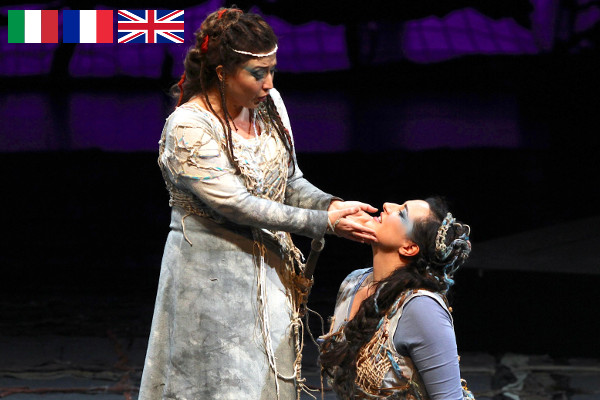Norma, o della grazia indifferente
di Suzanne Daumann
Non entusiasma la Norma al Carlo Felice di Genova nel secondo cast in cui si segnala il debutto nel ruolo eponimo di Desirée Rancatore. Spicca però l'ottima Adalgisa di Valentina Boi.
GENOVA, 27 gennaio 2018 - Ai nostri giorni, registi e direttori d'orchestra si prendono sempre maggiori libertà con le opere che interpretano: peccato che non si sia fatto un incantesimo per evitare la sensazione di prolissità in quest'opera. Forse non si potrà far molto di più per rendere incalzante e tesa l'azione, ma l'altra sera siamo rimasti abbastanza indifferenti.
L'allestimento di Luigi di Gangi e Ugo Giocomazzi si accontenta di collocare l'azione in uno spazio indefinito fra storia e sogno, aiutato dai costumi di Daniela Cernigliaro: prevede abiti storicizzanti per i Galli, lunghe vesti per sacerdoti e sacerdotesse, casacche e braghe per i guerrieri; i Romani per contro sono in uniformi moderne. La scena di Federica Parolini è interessante a vedersi: alberi morti, legati da un filo rosso, cornici da cui pendono bende in tessuto (o corteccia?), una tonda con striscie di velo bianco, senza dubbio la Luna. Almeno avevamo di che ragionare sul significato di questi simboli. Le belle luci di Luigi Biondi danno colore alle cornici e al fondale e sottolineano il contenuto drammatico delle scene, costituendo, ci pare, uno dei rari aspetti veramente positivi della produzione.
Quanto al canto, di fronte al secondo cast siamo rimasti sostanzialmente indifferenti: la Norma di Désirée Rancatore, atteso debutto nella parte, è molto graziosa da sentire, ma manca la statura vocale, il respiro, la profondità emotiva e la convinzione, e dunque è poco convincente. Ancor meno lo è Roberto Iuliano nei panni di Pollione. La rivelazione della serata risulta, invece, il soprano Valentina Boi come Adalgisa. Candore giovanile, forza e lirismo: ha tutto. Mihailo Šljivić è Oroveso. Negli assiemi le voci si uniscono in buona armonia e il coro costituisce un altro elemento degno di nota. Convincente pure la direzione musicale animata e attenta di Andrea Battistoni.
Luci e ombre, insomma; il pubblico, da parte sua, è ben soddisfatto, e tutto è bene quel che finisce bene...
foto Marcello Orselli
Doutes de circonstance
par Suzanne Daumann
Peu convaincante Norma avec les débuts de Desirée Rancatore dans le rôle. La révélation de la soirée était Valentina Boi dans le rôle d’Adalgisa.
Gênes, le 27 janvier 2018 - De nos jours, les metteurs en scène et chefs d’orchestre prennent de plus en plus de libertés avec les oeuvres qu’ils interprètent: dommage que personne n’ait encore fait un sort aux maintes longueurs de cet opéra. Il est peut-être impossible de lui inculquer une sorte de suspense contenu, toujours est-il que ce soir, nous sommes restés assez indifférents.
La mise en scène de Luigi di Gangi et Ugo Giocomazzi se contentait de situer l’action dans un espace indéfini entre histoire et rêve, aidé par les costumes de Daniela Cernigliaro: elle préconisait des habits historisants pour les Gaulois, longues robes pour prêtresses et prêtres, blouses et braies pour les guerriers; les Romains en revanche portaient des uniformes modernes. La scénographie de Federica Parolini était intéressante à regarder: arbres morts, reliés par un fil rouge, cadres dont pendouillaient bandes de tissu (écorce?), un cadre rond avec des bandes de tissu blanc, sans doute la lune… Au moins il y avait de quoi spéculer sur la signification de ces symboles. C’étaient les très belles lumières de Luigi Biondi qui mettaient en couleur ces cadres et leur arrière-plan et soulignaient le contenu dramatique des scènes et qui étaient un des rares points vraiment positifs pour nous.
Côté chant, face au second cast, on est restés tout aussi indifférents: la Norma de Désirée Rancatore, qui fait ses débuts attendus dans le rôle, était fort jolie à entendre, mais manquait de stature vocale, de souffle, de profondeur émotionnelle et de conviction, et de ce fait, était peu convaincante. Encore moins convaincant, Roberto Iuliano dans le rôle de Pollione. La révélation de la soirée était Valentina Boi dans le rôle d’Adalgisa. Candeur juvenile, force et lyrisme, elle avait tout. Mihailo Šljivić était Oroveso. Dans les ensembles, les voix se mêlaient harmonieusement, et le choeur était un autre élément remarquable. Convaincant aussi, plein d’entrain et attentif aux détails, la direction musicale de Andrea Battistoni.
Impressions mitigées somme toute; le public, en revanche, était ravi, et tout est bien qui finit bien…
foto Marcello Orselli
Mixed feelings for Norma
by Suzanne Daumann
Norma at the Teatro Carlo Felice in Genova left us with rather mixed feelings. Valentina Boi as Adalgisa was an highlight of the show.
GENOA, january 27th 2018 - These days, stage directors and conductors are taking quite a few liberties with the works they interpret: a pity that nobody has yet found it necessary to rid Bellini’s Norma of a few of its many lengthy passages at least. It might be impossible anyway to reshape its dramaturgy to a more continuous kind of suspense. Howsoever that might be, tonight’s performance left us with rather mixed feelings.
Luigi di Gangi and Ugo Giocomazzi’s staging simply situated the action in some kind of no man’s land between history and dream, underlined by Daniela Cernigliaro’s costumes. She put the Gauls into historical clothes, long robes for priestesses and priests, breeches and tunics for the warriors, whereas the Romans wore black modern uniforms. Federica Parolini’s scenography was interesting to look at: dead trees joined together by a thick red thread and strips of brown fabric hanging from wooden frames were the forest, a round frame with white strips of cloth was the moon. At least we could speculate about the meaning of all this symbolic stuff. Luigi Biondi’s lovely lighting gave colors to the backgrounds and lit these frames in various ways, highlighting the scenes’ contents; the lighting was one of the two real highlights of the evening.
Mixed feelings prevailed as to our reaction to the singers: Desirée Rancatore’s Norma, in her expected role debut, was lovely to hear, but she was lacking vocal stamina, strength, depths of emotion and conviction, and thus, was not very convincing. Even less convincing, Roberto Iuliano’s Pollione. The other highlight of the show was Valentina Boi as Adalgisa. She had it all, a lyrical voice, rounded and warm, juvenile candor, and quite easily stole the scene. Mihailo Šljivić was Oroveso. The voices blended well in the ensembles and the choir was remarkable.
Mixed feelings on the whole; the public, however, was delighted, cheers and applause were plentyful, and all is well that ends well.
foto Marcello Orselli












